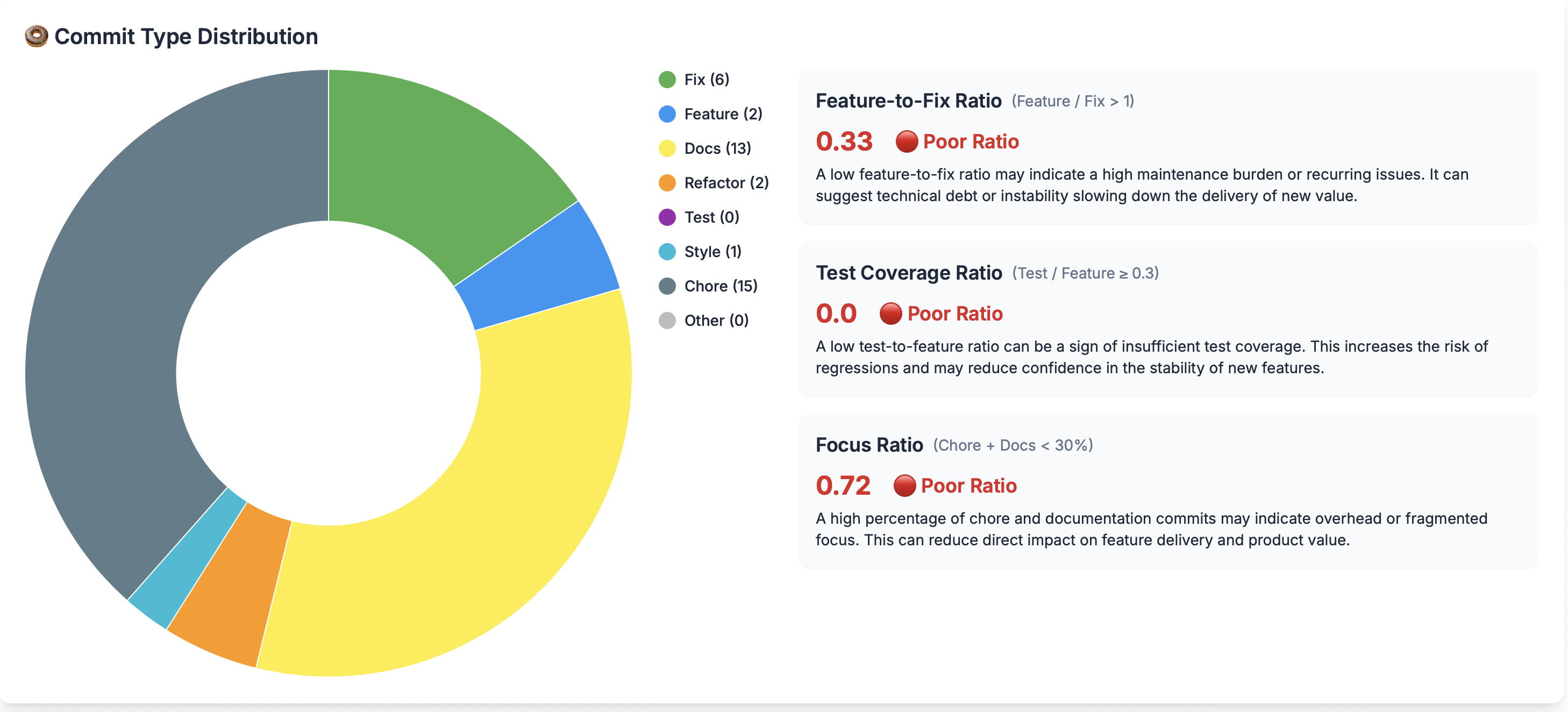Commit Classification
Track commit types and development patterns analysis
GitPulse uses AI-powered analysis to automatically categorize commits, providing insights into development focus and team priorities.
Conventional Commits Support
GitPulse automatically detects and analyzes commits following the Conventional Commits specification. This standardized format helps GitPulse provide more accurate classification and better insights into your development patterns.
Conventional Commits Format
GitPulse recognizes commits in the format:
<type>[optional scope]: <description>
[optional body]
[optional footer(s)]
Types recognized by GitPulse:
feat:→ Featurefix:→ Fixdocs:→ Docsstyle:→ Stylerefactor:→ Refactortest:→ Testchore:→ Choreperf:→ Fix (performance fixes)ci:→ Chore (CI/CD changes)build:→ Chore (build system changes)revert:→ Other
How GitPulse Classifies Commits
GitPulse uses a multi-layered approach to classify commits:
- Primary Classification: Based on Conventional Commits type when available
- AI Analysis: Machine learning analysis of commit messages and code changes
- Pattern Recognition: Identifies common commit patterns and keywords
- Fallback Classification: Uses commit message content when conventional format isn't available
AI-Powered Commit Analysis
GitPulse analyzes commit messages and changes to automatically classify commits into meaningful categories, helping you understand what your team is working on.

Commit Categories
Feature Development
Commits that add new functionality or features:
- New Features: Brand new functionality
- Feature Enhancements: Improvements to existing features
- User Interface: UI/UX changes and improvements
- API Extensions: New endpoints or API changes
What it tells you
- How much effort goes into new development
- Whether the team is focused on growth
- Product development velocity
Bug Fixes (Fix)
Commits that address issues and problems:
- Bug Fixes: Corrections to existing functionality
- Hotfixes: Urgent fixes for critical issues
- Regression Fixes: Fixes for recently broken features
- Performance Fixes: Optimizations and speed improvements
What it tells you
- Code quality and stability
- How much time is spent on maintenance
- Whether new features are causing issues
Code Quality
Commits focused on improving code structure:
- Refactoring: Code restructuring without changing behavior
- Code Cleanup: Removing dead code and improving readability
- Architecture Changes: Structural improvements
- Technical Debt: Addressing accumulated issues
They are categorized as Refactor, Style
What it tells you
- Code maintenance practices
- Technical debt management
- Code quality focus
Testing
Commits related to testing and quality assurance:
- Test Additions: New test cases and coverage
- Test Fixes: Corrections to existing tests
- Test Infrastructure: Testing framework improvements
- Integration Tests: End-to-end testing
What it tells you
- Quality assurance practices
- Test coverage priorities
- Testing culture maturity
Documentation
Commits that improve project documentation:
- README Updates: Project documentation improvements
- API Documentation: Code documentation
- User Guides: User-facing documentation
- Technical Docs: Developer documentation
What it tells you
- Documentation practices
- Knowledge sharing focus
- Project maturity
Infrastructure
Commits related to deployment and infrastructure:
- CI/CD Changes: Pipeline improvements
- Deployment Updates: Release and deployment changes
- Environment Config: Configuration management
- DevOps Tools: Infrastructure automation
What it tells you
- DevOps maturity
- Deployment practices
- Infrastructure focus
Dependencies (Chore)
Commits that update external dependencies:
- Package Updates: Dependency version updates
- Security Updates: Security-related dependency changes
- New Dependencies: Adding new libraries
- Dependency Cleanup: Removing unused dependencies
What it tells you
- Dependency management practices
- Security awareness
- Technical debt management
Key Ratios and Metrics
Feature-to-Fix Ratio
Measures the balance between new development and maintenance:
- High Ratio (3:1+): Heavy focus on new features
- Balanced Ratio (1:1-2:1): Good balance of features and fixes
- Low Ratio (<1:1): More maintenance than new development
What it tells you
- Whether the team is growing or maintaining
- Code stability and quality
- Product development stage
Test Coverage Ratio
Measures the proportion of testing-related commits:
- High Ratio (20%+): Strong testing culture
- Medium Ratio (10-20%): Good testing practices
- Low Ratio (<10%): Limited testing focus
What it tells you
- Quality assurance maturity
- Risk management practices
- Code confidence levels
Focus Ratio
Measures the balance between product work and infrastructure:
- High Ratio (80%+): Heavy product focus
- Balanced Ratio (60-80%): Good product/infrastructure balance
- Low Ratio (<60%): More infrastructure than product work
What it tells you
- Team priorities and focus
- Technical debt vs. feature development
- Platform maturity
Troubleshooting
Common Issues
Poor Classification Accuracy
- Cause: Unclear or inconsistent commit messages
- Solution: Establish clear commit message guidelines
Missing Categories
- Cause: Commits don't fit existing categories
- Solution: Review and update classification rules
Inconsistent Ratios
- Cause: Team not following commit standards
- Solution: Provide training and establish guidelines
Getting Help
- Team Guidelines: Establish clear commit standards
- Training Sessions: Provide commit message training
- Tool Integration: Use tools that improve commit quality
- Regular Reviews: Discuss commit patterns regularly